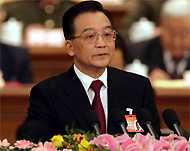China Congress focuses on rural woes
Chinese Prime Minister Wen Jiabao has opened the annual session of the country’s parliament with promises of massive new social spending to placate the poor, restive countryside.

“Building a ‘new socialist countryside’ is a major historic task,” Wen said in his nationally televised address to the National People’s Congress (NPC) on Sunday.
Outlining China’s economic path for the year ahead he said the country’s red-hot economy was expected to cool slightly this year, but should still grow by 8%.
Wen also warned Taiwan, which the communist Beijing government claims as its own territory, not to pursue formal independence.
This year’s session of the NPC is to focus on efforts to ease tensions over the gulf between China‘s rich and poor by spending more to help the countryside, home to 800 million people, and others left behind by its economic boom.
|
“Building a ‘new socialist countryside’ is a major historic task” |
The government is promising to spread prosperity to the countryside amid mounting rural anger over chronic poverty, corruption and the seizure of farmland for factories and other development projects.
Financial problems
Wen said that this year Beijing would spend an extra $5.2 billion on rural schools, hospitals, crop subsidies and other programmes, raising spending on those areas by 15%.
There were no immediate signs of any protests around the heavily-guarded Great Hall of the People in central Beijing. Streets were closed and the government said 15,000 police officers were deployed.
 |
|
Wen’s speech highlighted China’s |
Protesters detained in previous years have included laid-off workers, farmers with land disputes and members of the banned Falun Gong spiritual movement.
The prime minister promised “fast, yet steady” economic development, but said growth was expected to fall to 8% – down from 9.9% last year and below a World Bank projection of 9.2% for 2006.
Wen did not explain why the official target was below economists’ projections. But Beijing has been trying to restrain sizzling growth in recent years, warning that a prolonged annual rate above 9% could ignite inflation and cause financial problems.
Wen said a key government priority would be increasing domestic consumption – part of efforts to sustain growth while easing reliance on exports amid pressure by the United States and other trading partners to cut China’s huge trade surpluses.
The prime minister vowed to resume dialogue with Taiwan, split from the mainland since 1949, but warned the island’s democratically elected leaders against pursuing formal independence – a step that Beijing has said could lead to war.
Monopoly on power
|
NPC, China’s parliament – The NPC opened a 10-day session on Sunday. – The NPC meets annually in march to pass bills, approve budget and personnel nominations. – Votes almost always follow the Communist Party’s wishes and pass by an overwhelming majority. – The nearly 3000 delegates represent China’s 31 provinces, municipalities and autonomous regions. |
Beijing has no official relations with Taipei and reacted angrily this week when Taiwan‘s President Chen Shui-bian abolished an agency dedicated to unifying the island with the mainland.
“We will uncompromisingly oppose secessionist activities aimed at Taiwan independence,” Wen said, signalling that Beijing has no intention of softening its line on the island.
The prime minister’s report included no mention of political reform – a taboo topic in a system where the ruling Communist Party rejects any challenge to its monopoly on power.
The government has announced on Saturday that its military budget this year will rise 14.7% to $35.3 billion.
China has given its 2.5 million-member People’s Liberation Army double-digit spending increases nearly every year since 1990, causing unease among its neighbours about its military ambitions.
The NPC’s 10-day annual session is a carefully scripted event for an almost powerless body that routinely endorses policies already decided by the communist leaders.
But a series of closed-door meetings during the session also are expected to give delegates a chance to air grievances and propose their own ideas for reforms.